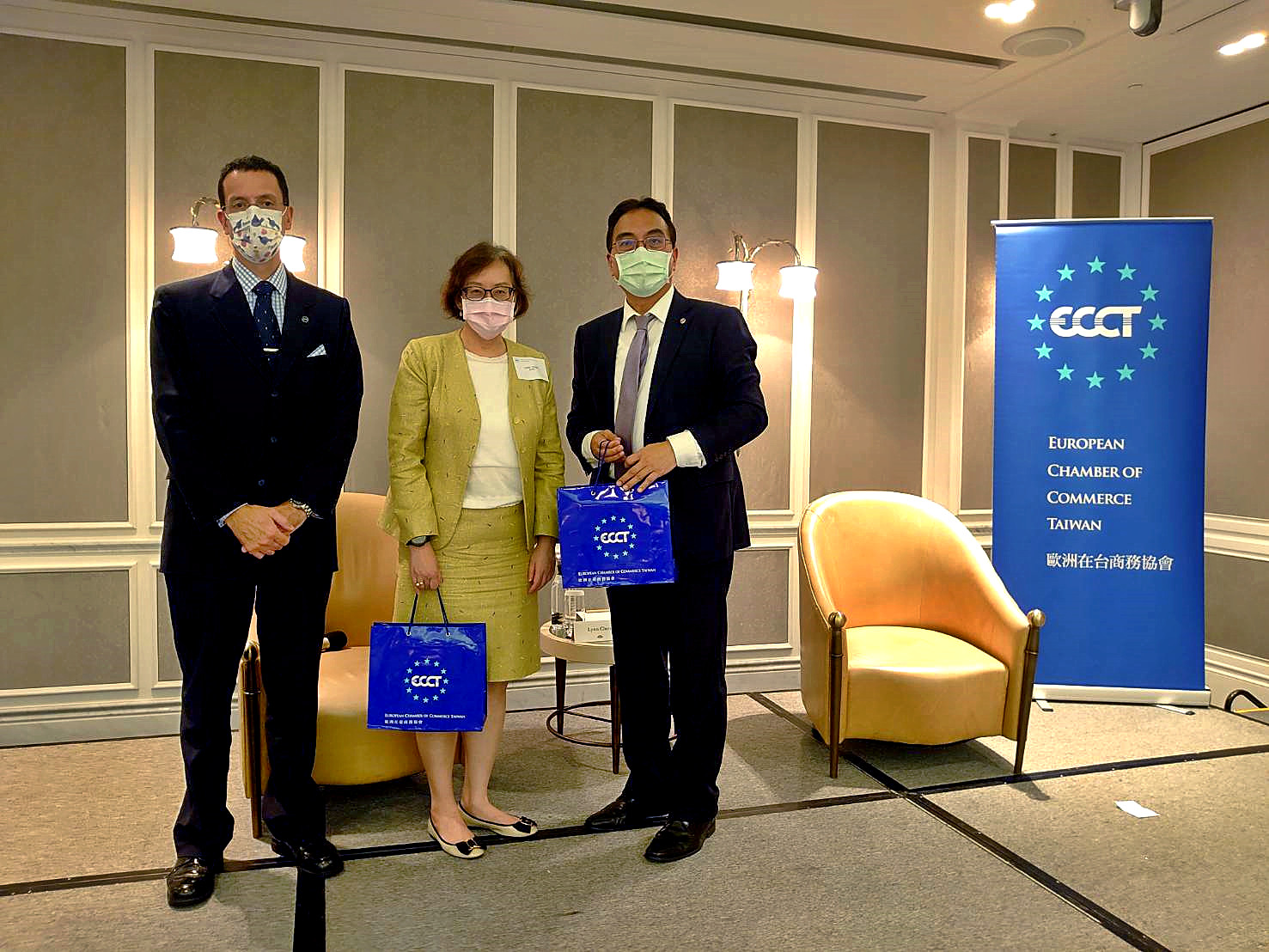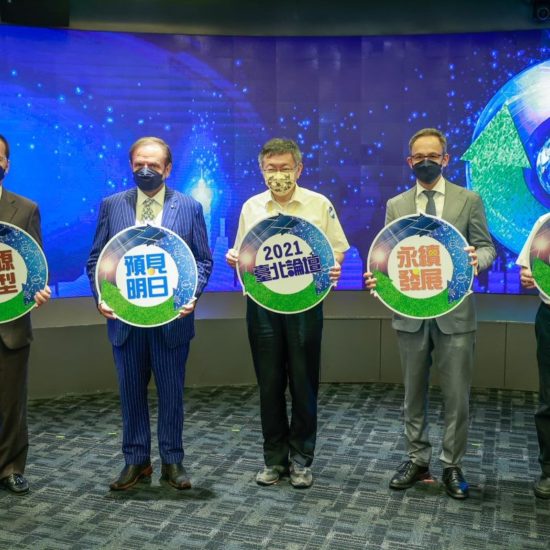Lunch on new real estate tax regime

The ECCT's Tax committee arranged a lunch on the topic "Impacts of Upgraded Consolidated Land and Building Tax Regime 2.0" featuring speakers Lynn Chen, Partner at KPMG Taiwan and Tony Chao, Managing Director of JLL Taiwan. The speakers gave an overview of recent changes to tax laws aimed at curbing real estate speculation and the implications for investors and corporations.
The Consolidated Land and Building Tax regime was first introduced under Taiwan's Income Tax Act and became effective in 2016. Then, with the aim of curbing real estate speculation, the Ministry of Finance (MOF) proposed the Consolidated Land and Building Tax Regime 2.0, which was passed by the Legislative Yuan and became effective on 1 July 2021.
The key changes to the amended rules include extending the real estate holding period by individuals and corporations under different tax rates categories and limitations on claiming the Land Value Incremental Tax (LVIT) for capital gains calculation.
Under the old rules, gains from the sale of buildings were taxable and subject to individual income tax while gains from the sale of lands were exempt from individual income tax but subject to LVIT. The LVIT was generally based on government assessed values, which are lower than market values and do not change much over time.
However, the government judged the old rules as in need of reform because they created arbitrage opportunities which drew capital into the real estate market and drove up property prices. The government therefore adopted the House and Land Transactions Income Tax ("Regime") to replace the luxury tax aimed at tempering the overheated real estate market.
The main features of Regime 2.0 are as follows: It extends the holding period for higher tax rates, aligns the tax rates of capital gains from sale of real estate by corporations with individuals tax treatments, treats the sale of qualified unlisted real estate-rich company shares as sale of real estate, and widens the scope to include pre-sale houses. However, certain specific real estate transactions are excluded from Regime 2.0.
For individuals, the new rules mean that holding real estate for shorter periods will be subject to higher tax rates (rising from 35% to 45% of gains for holding less than two years and up from 20% to 35% if held for between two and five years) while capital gains must be reported to authorities within 30 days from the day after the title deed transfer. In addition, LVIT is still payable under the new regime.
For companies, under the old regime, there were no holding period limits and they were only subject to a 20% tax rate. Under the new rules, if real estate was purchased after 2016 it will be subject to Regime 2.0 and the tax payable on gains from the sale of real estate should be calculated separately from the regular 20% corporate income tax.
The revisions also widen the scope of properties to which the tax applies where the transfer of real estate rich unlisted company shares as well as the sale of presale homes will now fall under the regime.
Previously, companies that had significant real estate holdings could avoid taxes. Under Regime 2.0, the tax payable on gains from the sale of real estate should be calculated separately from the regular 20% corporate income tax if 50% or more of the company's outstanding share (capital) value is contributed by land and housing in Taiwan.
However, there are some exceptions. Gains on the sale of real estate for housing registered for self-usage for over six years is subject to only a 10% tax rate of which the first NT$4 million is exempt from taxable income. Also, for Individuals, a 20% tax rate is applied for "involuntary" sales of real estate held less than five years due to specific circumstances, such as because of job relocation or termination, the real estate is sold to raise funds for medical expenses, or to avoid domestic violence perpetrators. For corporations, there are also exceptions, such as if the construction company sells the property it built for the first time.
Regime 2.0 also closes loopholes for so-called red sheets (which grant the right to acquire real estate before building permits have been approved) and so-called pre-sale properties (under construction following the approval of building permits). Under Regime 2.0, red sheets may no longer be traded and income derived from the sale of pre-sale properties is now taxable.
Chen concluded that foreign investors who conduct M&A or restructuring may be directly or indirectly subject to Regime 2.0 if shares of the subsidiaries become qualified shares. Given the fact that the new regime has only been in place for a few months it remains to be seen how the tax authority will apply the value used in the 50% value attribution rule with respect to the sale of real estate rich-company shares and whether or not tax relief is available through one of Taiwan's tax treaties with other countries.
In his presentation, Tony Chao noted that there had been a short-term spike in property transactions ahead of the implementation of the Regime 2.0 and a decline in the two months since implementation, which has decreased supply in the short term. However, it remains to be seen if it will have any lasting effect. One positive impact of the new regime is that it has made the previously opaque red sheet and pre-sale market much more transparent.
As for the impact on prices, Chao noted that average housing prices in Taiwan have doubled over the past 18 years and tripled in Taipei City. Now, a shortage of available land, excess capital and a surge in construction costs (which he said had risen by 14% since the Covid-19 pandemic), make it unlikely that Regime 2.0 or any other currently foreseeable factor will cause prices to fall. On the land issue, even though Taipei has a high percentage of old buildings (60% of Taipei's buildings are over 30 years old and 70% of them do not have lifts), the process of urban renewal under current laws is likely to remain slow.
According to Chao, housing demand is now driven more by buyers wanting to upgrade to better properties rather than speculation. In addition, Taiwan's booming high tech sector is driving demand in certain areas, especially those located close to Taiwan's major science parks.
In terms of commercial real estate, investment is still robust and industrial property investment accounts for the largest share (90%) of investment. In terms of office space, there is currently a very low vacancy rate, despite the pandemic. Chao expects the supply to remain tight, especially in Grade A office space, until 2025. The supply shortage has driven up prices in some premium Grade A space by up to 40% over the past three years. However, this should be seen in context, since prices today are still lower than they were at their peak in the year 2000.
Looking ahead to the post-pandemic world, hybrid working has become a reality but the impact on office property remains to be seen. According to surveys cited by Chao, 61% of people, especially young people, want to go back to the office. While working from home may decrease the overall need for office space, the more significant developments are likely to be a redesigning of office spaces to create more shared areas, and greener and more attractive environments to attract talent.
On the subject of retail space, Chao expressed the view that e-commerce is having an impact on retail property. While shopping in person will not disappear, some retail spaces may be repurposed for other uses.
Please refer to ECCT luncheon-JLL 2021.10.1 for downloading the presenter's slides (JLL).

